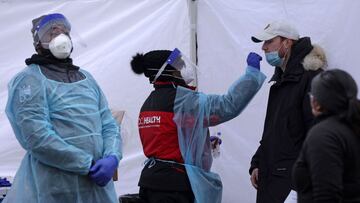Can a PCR tell me which variant of covid-19 I have?
We’ve all become familiar with PCR tests, a swab up the nose and soon after you know if you have covid-19. But can the test tell which variant you have?

PCR tests have become common place since the onset of the covid-19 pandemic, allowing people to quickly find out if they’ve been infected or not. There have been many variations of the novel coronavirus that has upended lives, but the thirteenth named variant Omicron is causing special concern.
The US was already in the throws of a new surge driven by the Delta variant when Omicron came onto the scene. The even more contagious strain of covid-19 is quickly replacing Delta as the dominant variant. So far, the PCR tests have been able to detect all the iterations of covid-19, but can they tell you which one you have?
Also see:
- Omicron variant now dominant in US as cases surge
- Does Omicron evade the vaccine?
- What are the symptoms of Omicron in children?
- Antiviral covid-19 pill could be approved this month
PCR tests detect specific segments of a DNA sequence
PCR means polymerase chain reaction, or sometimes called “molecular photocopying.” It is a technique researchers use in a laboratory to copy specific segments of a DNA sequence using selective primers. The covid-19 PCR tests can detect the presence of genetic material from the virus, or even fragments of it after you are no longer infected.
Specifically in the case of the covid-19 PCR test it is looking for RNA from the virus. RNA stores genetic information and is the DNA’s messenger carrying instructions to cells for which proteins to build. If any of the virus' genetic material is present in the nasal cavity, it will get collected on the swab which can then be replicated into DNA.
Researchers have discovered that the SARS-CoV-2 genome, or covid-19, consists of almost 30,000 RNA bases. Scientists have narrowed down which are known to encode protein-coding genes specific to covid-19.
Extremely useful chart as covid runs rampant in the UK and we all plan for Christmas
— Hannah Murphy (@MsHannahMurphy) December 19, 2021
It shows how long after exposure to covid you will be detectable by a lateral flow test vs a PCR test if you do have it
And at what stages you are likely infectious pic.twitter.com/GJjeUz5XAa
PCR tests are accurate at diagnosing covid-19 but not variants
SARS-CoV-2, or covid-19, is a coronavirus of which there are hundreds, but only a handful affect people and are responsible along with other bugs in causing the common cold, usually making you feel miserable but generally aren’t lethal. However, covid-19 should not be confused with the others and can cause more severe illness which resulted in many deaths.
The genetic differences between SARS-CoV-2 and other coronaviruses makes it possible to create a PCR test specific to covid-19. The rapid PCR tests only look for those genes which are unique to covid-19, of which there are many strains from countless mutations. The PCR tests can’t identify a specific strain, that work is done through gene sequencing of positive test samples in a lab.
There are numerous variants but only a select few are causing concern
Scientists have discovered thousands of mutations or variants of SARS-CoV-2 but only a limited number have created enough concern among health experts to be categorized. The World Health Organization (WHO) has a list of variants, “variants under monitoring,” “variants of Interest,” and “variants of concern.”
Related stories
To help communicate the risks associated the WHO opted to give variants of interest and concern names based on the Greek alphabet. The most recent member of that list, and considered a variant of concern, is Omicron which is the fastest spreading strain yet of covid-19. It went from being a fraction of new infections to the dominant variant in a matter of a few weeks.
So far initial indications appear to show it may cause less severe illness than other strains, although the data is not yet conclusive. At least one death of a man in his 50s who was unvaccinated has now been associated with complications from infection with Omicron.
